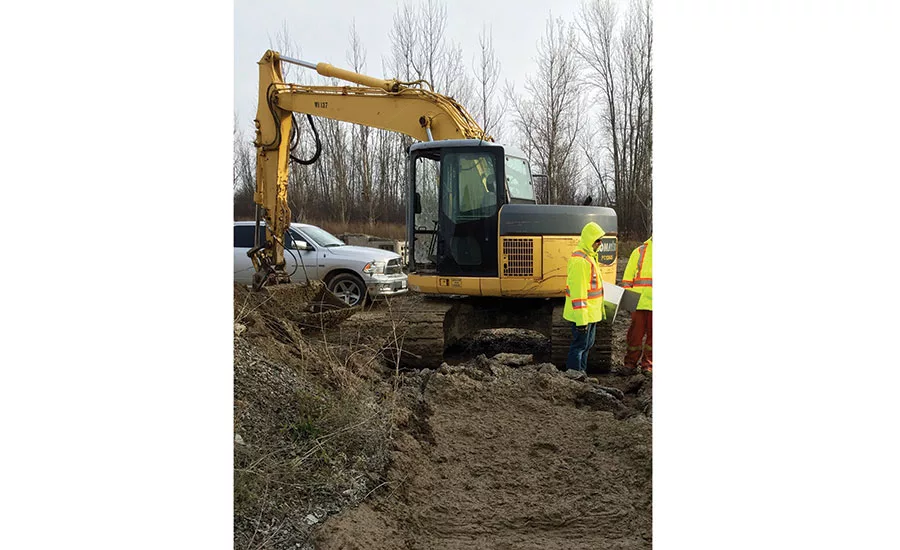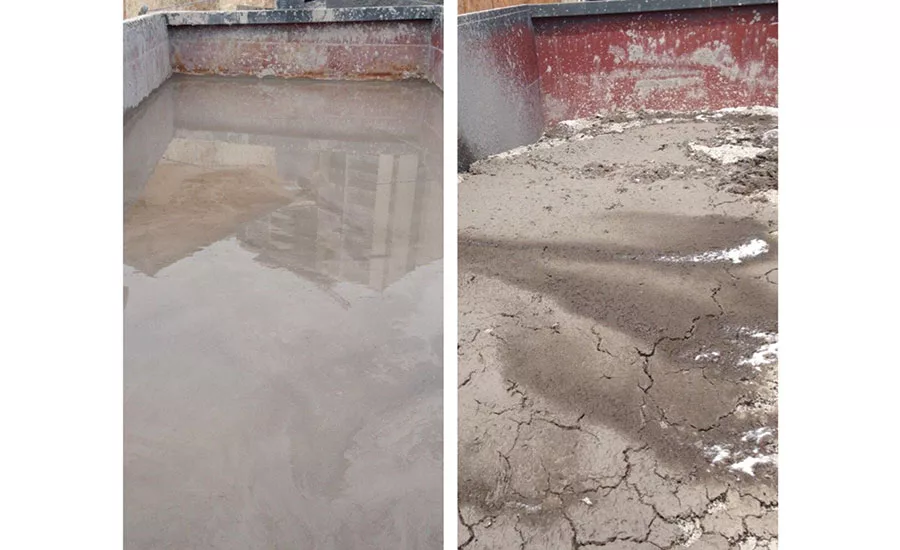Working with Bentonite-Based Reagent in Drilling Fluids Disposal

Bentonite-based blends with SAPs, which are inert, environmentally safe, and do not change spoil chemistry. Contractors can mix them in with an excavator or backhoe. Source: CETCO Drilling Products photos

Solidification reagents can help you go from mess, left, to ready for disposal quickly, and can be critical for small, urban jobsites. Source: CETCO Drilling Products photos
One challenge for many drilling contractors is disposing of drilling fluids. Many states are imposing tighter regulations on contractors regarding the disposal of this liquid waste. The regulations vary depending on the state in which you conduct business. In addition to the regulations, there may be other challenges involved in managing the waste stream associated with drilling operations. One example is working in a confined area in an urban center. Waste may need to be disposed of quickly due to space restrictions.
There are currently many options for disposing of waste materials. They include:
- Land farming/land application
- Landfill
- In-situ disposal
- Solidification
The removal of liquid waste is common, however it may not always be the most economical solution depending on the distance to the nearest land farm or disposal site. The disposal of liquid waste to a landfill typically increases the budget for waste removal.
The use of solidification agents to take liquid waste and change it to a solid on site is an option which more contractors are taking a serious look at. This is not a new concept. Historically, drilling spoils have been solidified using sawdust, soils, concrete or lime. Another option that is inert, environmentally safe and does not change the chemistry of the spoils is the use of a bentonite-based blend containing super absorbent polymers (SAPs). Such mixtures are designed specifically for the solidification of drilling fluids. Compared to concrete or sawdust these mixtures add very little volume to the waste, which is a consideration if the solids have to be removed from site. This is an important consideration due to the added cost of shipping higher volumes of waste.
The advantages of using a solidification reagent that contains bentonite as well as SAPs include:
- The massive surface area of the montmorillonite platelets has the potential to bind even some non-aqueous fractions such as oils, pesticides and gasoline.
- Bentonite is also very good at sequestering heavy metals.
- Heavy compressive loads will not cause bentonite to lose its adsorbed water.
- Bentonite is actually more tolerant of salts than are most polymers. This means that the percentage increase in dosage required for use in saltwater is lower for bentonite than it is for purely polymer-type product solidification agents.
- Super-absorbent polymers adsorb water like nothing else.
- The dosages needed are typically very, very low.
- The resulting solidified waste tends to be non-sticky, yet still cohesive and easy to transport.
The solidification products can be mixed on site in many ways. The simplest method is to mix in the solidification reagent utilizing a backhoe or excavator. Other options to mix in the reagent on site include soil mixing equipment as well as pug mills. Efficiency, when using a solidification reagent, increases with the amount of shear.
A paint filter test is the standard method used in the United States to determine that the processed waste is a solid. A 100 gram or 100 mL sample of the waste is placed in a 60 mesh screen for a period of 5 minutes. If any material passes through the filter during that time there are free liquids present and the waste is not a solid.
Solidification on site is not always the best solution for disposal of spoils. The benefits of each option to dispose of spent drilling fluids should be considered for every project. The option that adheres to local regulations, as well as being quick, easy and economical, will ultimately be chosen. Bentonite-based solidification reagents containing SAP are one option that drilling contractors may be able to use to more efficiently deal with the increasing challenges of waste disposal.
For more Drilling Fluids columns, visit www.thedriller.com/drillingfluids.
Looking for a reprint of this article?
From high-res PDFs to custom plaques, order your copy today!

